Today, we have a strong foundation of knowledge to help us understand the world around us. We rely on scientific facts and data to govern our way of thinking. But before we got to this point, humans had to rely on other ways to interpret the world. For the ancient Greeks, it was mythology and legends.
Greek gods personified scientific principles and rudimentary concepts we take for a fact today. Back then, it was a way to explain the unexplainable.
Things started to change when brilliant scholars emerged. Ancient Greek philosophers challenged the foundations of myths. He used logic and reason to unravel the mysteries of the universe.
Many of the scholars from ancient Greece shaped how we approach challenges today. They influenced our ability to solve problems, explain complex paradigms, and use reason to build academic foundations.
Their contribution is nothing short of world-changing. That’s why so many Greek philosophers are still the subject of discussion today. Whether you’re looking to dive head-first in the investigations of natural phenomena by Pre-Socratic philosophers or you want to revel in the simplicity of pleasure by learning about Epicureanism, there’s a lot to discover.
Here’s some need-to-know information about some of the most famous Greek philosophers in history.
Democritus (c 460 BC – 370 BC)

Democritus is a Pre-Socratic figure who heavily influenced Western philosophy. For many scholars, he’s considered the grandfather of modern medicine. Not only did he establish theories we still use today, but he also had strong ideas about justice, health, and life itself.
Largely ignored by ancient Athens, Democritus had a somewhat controversial reputation. Plato rejected his ideas, with the famous philosopher reportedly calling for his books to burn. However, he was well-known by Aristotle and eventually taught Protagoras.
The most significant contribution to science was the formation of the atom theory. He established the concept that everything was made out of indestructible atoms. Democritus also believed that the soul is comprised of fire atoms. He also thought that the Milky Way was a concentration of faraway stars.
The philosopher had strong thoughts on politics and ethics as well. He believed that everyone should take up arms to defend themselves: An argument that’s still raging strong today. Democritus also believed in the power of happiness. He even earned the nickname of “The Laughing Philosopher.”
Democritus had a sour reputation in Athens. However, he had strong connections with other philosophers of the time. Several works depict him alongside Heraclitus.
Diogenes (c. 412 BC – 323 BC)
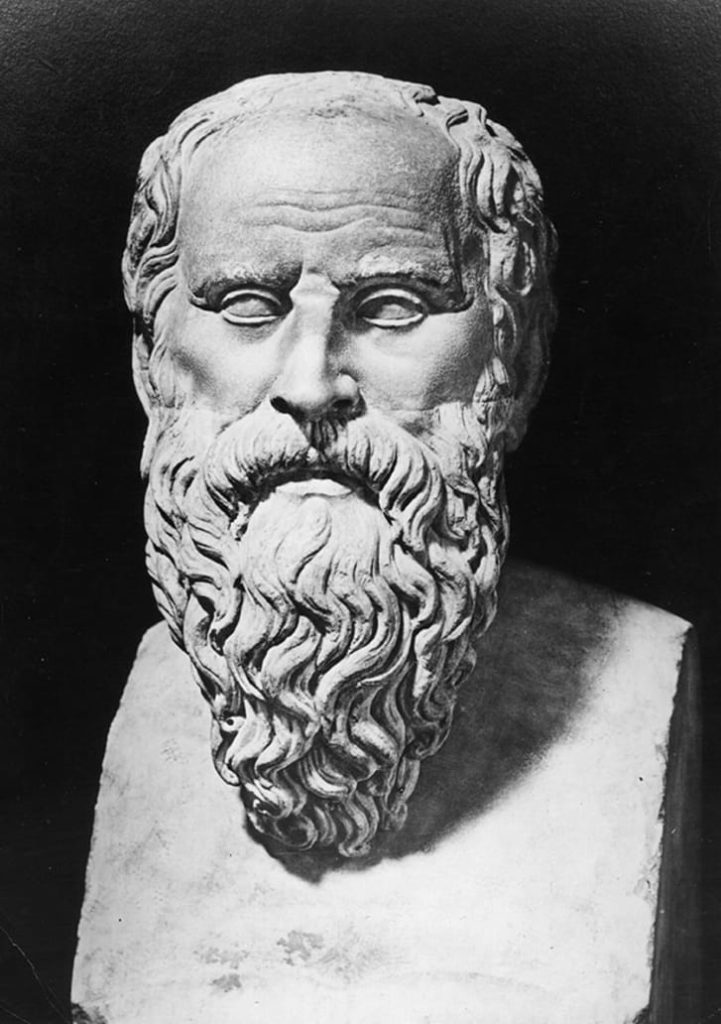
Diogenes is a controversial philosopher because his beliefs differed considerably from other thinkers of his time. He was one of the founders of Cynic philosophy. Cynicism is a way of thinking that centers around the belief that life’s purpose is to live in virtue. Cynicism says that virtue is best revealed in action rather than theory.
Diogenes took his dedication to the extreme! He rejected material things and essentially lived in poverty. Rather than claiming allegiance to one place, he thought of himself as a global citizen. The philosopher followed in the footsteps of Antisthenes, who was a student of Socrates. However, Antisthenes didn’t want anything to do with him, making Diogenes the target for brutality. Eventually, Antisthenes gave in and took him as his pupil.
This philosopher truly did not care what others thought. He lived his life free from social conventions. The philosopher believed that humans should live in a natural animal state and let the rhythms of nature govern actions. Eventually, Diogenes developed a reputation for being obscene and dog-like. He was mocked frequently and showed very little interest in anything. One story says that Alexander the Great approached him asking if he needed help. While others would fall to Alexander’s feet, Diogenes simply brushed him off and asked him not to block his sunlight!
Famous Quotes of Diogenes
” The foundation of every state is the education of its youth.”
“We have two ears and one tongue so that we would listen more and talk less.”
“Of what use is a philosopher who doesn’t hurt anybody’s feelings?”
Epicurus (431 BC – 270 BC)

Epicurus (Epicuros) is the founder of Epicureanism. Epicureanism is an influential school of thought that thrived during the Post-Socratic era. After the death of Alexander the Great, new schools focusing on personal ethics appeared throughout the Hellenistic world. Epicurus founded “The Garden,” which led to Epicureanism’s creation.
Epicureanism advocated for hedonism. The founding principle was that pleasure was the ultimate form of good. Also, it stated people should focus on maximizing pleasure to keep evil away. This way of thinking reached its height of popularity during the later years of the Roman Republic. But it wasn’t without controversy.
This philosopher had a lot of detractors. Epicureanism was thought to be nothing more than an excuse for immoral pleasure. However, Epicurus didn’t view sinful acts as a necessary element of Epicureanism. He believed that friendship was the ultimate form of delight.
For this reason, his followers were more than just students. They were friendly companions who prioritized obtainable pleasure. Not only did they seek enjoyment at every turn, but they also worked hard to be just and wise.
Epicurus also thought that death was a powerful opposing force to his way of life. The philosopher thought that humans shouldn’t fear death, as it didn’t involve pain in any way.
Famous Quotes ofEpicurus
“Do not spoil what you have by desiring what you have not; remember that what you now have was once among the things you only hoped for.”
“Is God willing to prevent evil, but not able? Then he is not omnipotent.
Is he able, but not willing? Then he is malevolent.
Is he both able and willing? Then whence cometh evil?
Is he neither able nor willing? Then why call him God?”
“He who is not satisfied with a little is satisfied with nothing.”
Parmenides (560 BC – 510 BC)
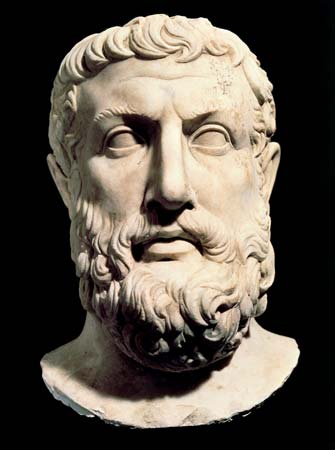
Parmenides was a pre-Socratic philosopher from Magna Graecia. Magna Graecia was a southern coastal area of Italy where Greeks lived around the 5th century BCE. The philosopher was one of the founders of ontology, which focuses on concepts of existence. He founded the Eleatic school of philosophy, which had famous students like Zeno of Elea and Melissus of Samo. Scholars also believe that he taught Xenophanes.
Parmenides was a known follower of Pythagoras. There’s no denying that Parmenides contributed greatly to ancient Greek philosophy. However, there’s only one surviving work. It’s called “Oh Nature.”
In this poem, Parmenides tries to answer a rhetorical question: “Is it or is it not?” The poem attempts to explain how reality is one and that existence is timeless. He believed that change was impossible and the world of appearances was false and deceitful.
Anaxagoras (500 BC – 428 BC)

The name Anaxagoras roughly translates to “Lord of assembly.” It’s a fitting moniker considering that this philosopher focused his studies on the formation of the universe. He came from Clazomenae in Asia Minor and was born to a wealthy family. Eventually, the philosopher moved to Athens, where he would live, study, and teach for over three decades.
Anaxagoras rejected the ideas of many philosophers, directly challenging Parmenides and Empedokles. He believes that the universe was made up of infinite particles rather than four essential elements. He proposed many theories, including one that attributed chaos and impurity as our nexus of creation.
During his studies, Anaxagoras would discover the true cause of eclipses. He also attempted to explain phenomenons like rainbows, meteor showers, and more.
Many of his thoughts contradicted Greek mythology. His theories for the sun and moon were particularly controversial. As a result, Anaxagoras faced some real-world consequences. He was charged and convicted of atheism, leading to his banishment from Athens.
Anaximander (610 BC – 546 BC)
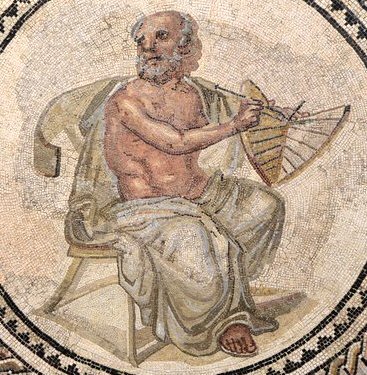
Anaximander was another Pre-Socratic philosopher. He came from Miletus, which was a city in Ionia. He studied at the Milesian school and was one of the first disciples of Thales. Many scholars consider him to be a successor. Historically, he’s also one of the first known philosophical writers. Many of the surviving works of Western philosophy came from his hand.
Like his teacher before him, Anaximander’s theories revolved around the cosmos. He expanded upon Thale’s teachings, using mathematics to support his theories. This philosopher is the first speculative astronomer in history. He rejected the flat-earth theory and the thought that the universe was closed.
He created the very first image of an open universe, believing that Apeiron was the origin of all things. In ancient Greek philosophy, Apeiron was an infinite substance. Anaximander used Apeiron to explain polar opposites like light and dark, hot and cold, and more.
Other theories included the plurality of worlds. He had similar beliefs to atomists Leucippus and Democritus. The philosopher also challenged religious views. Most notably, he believed that meteorological phenomena were caused by elements rather than the divine. He didn’t subscribe to the idea like lightning and thunder came from the gods.
He’s also remembered as one of the first to create an accurate world map, contributing to the development of geography.
Empedocles (490 BC – 430 BC)
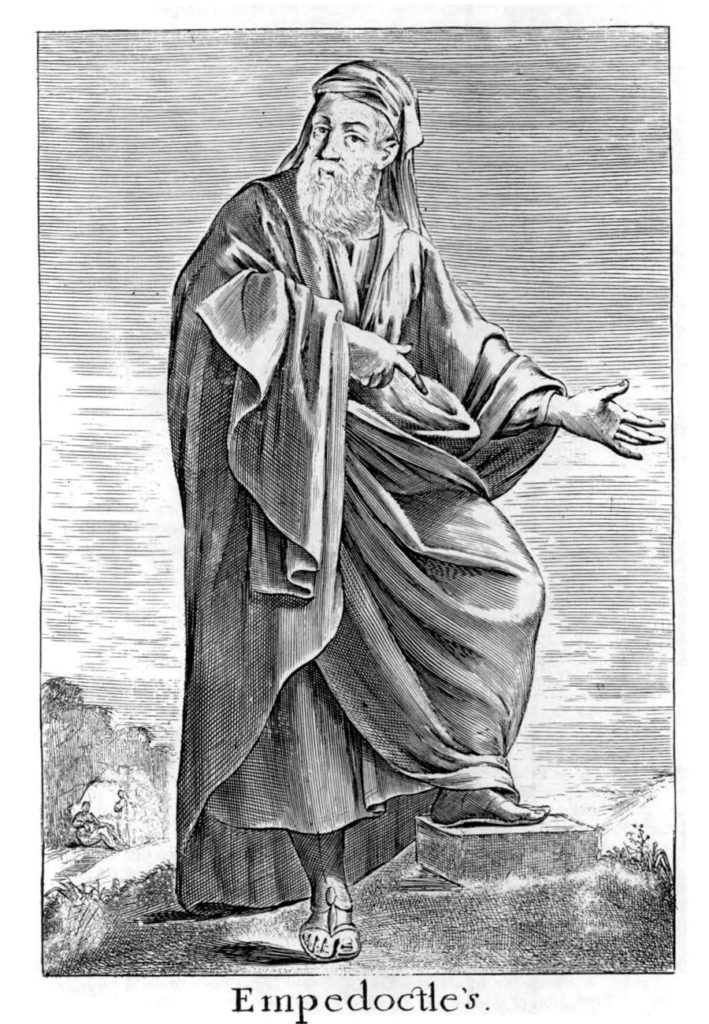
Empedocles (Empedokles) was a pre-Socratic philosopher who focused on natural phenomena. He was born in a Sicilian city called Akragas. There, he founded the medical academy. His beliefs were hit and miss compared to what we know of the world now. But in his time, he was a great thinker who set the stage for pre-Socratic philosophers who followed.
One of the most important principles he established was the theory of the four classical elements. Essentially, he said that all matter consisted of four standard elements. These included air, water, fire, and earth. Empedocles also believed that two additional forces came into play. He called them Love and Strife. He proposed that Love and Strife served to mix and separate elements that created matter.
Additional thoughts from Empedocles included the nature of the heart and brain. He believed that the heart was the organ of consciousness and not the brain.
Empedocles was one of the last Greek philosophers to record his ideas in verse. As a result, there are more surviving works of Empedocles than any other Pre-Socratic philosopher.
Empedocles is the source of inspiration for many literary works. His musings were a bit unorthodox, and the events surrounding his death were glamorized through poems and songs. According to legend, he threw himself into Mount Etna so that people would think he became immortal.
Zeno (490 BC – 430 BC)
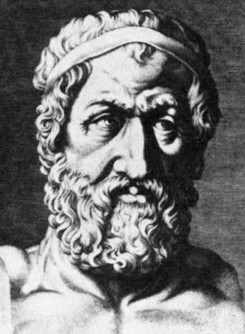
Not to be confused with Zeno Of Citium, Zeno of Elea was a pre-Socratic philosopher from Magna Graecia. As mentioned earlier, he studied under Parmenides at the Eleatic school. Zeno’s main priority was to understand the complexities of motion and plurality. He’s most famous for developing paradoxes. He even doubled down on the theories of Parmenides, which were the source of controversy for many philosophers at the time.
There’s not much information about Zeno’s life or work. There are no surviving texts, and most of the knowledge we have about this philosopher comes from Aristotle. Aristotle called him the inventor of dialectic. Dialectic is a type of discourse where two opposing sides use reasoned argumentation to establish a modicum of truth. It’s similar to debate but focuses more on abstract concepts rather than finite truths.
Zeno’s paradoxes continue to challenge scholars to this day. Most of them involve physics. He created illustrations to question the normal foundations of knowledge at the time. Interestingly, Zeno is the first philosopher in history to show that the concept of infinity existed. His paradoxes infuriated mathematicians, physicists, and philosophers of his era.
Pythagoras (570 BC – 495 BC)
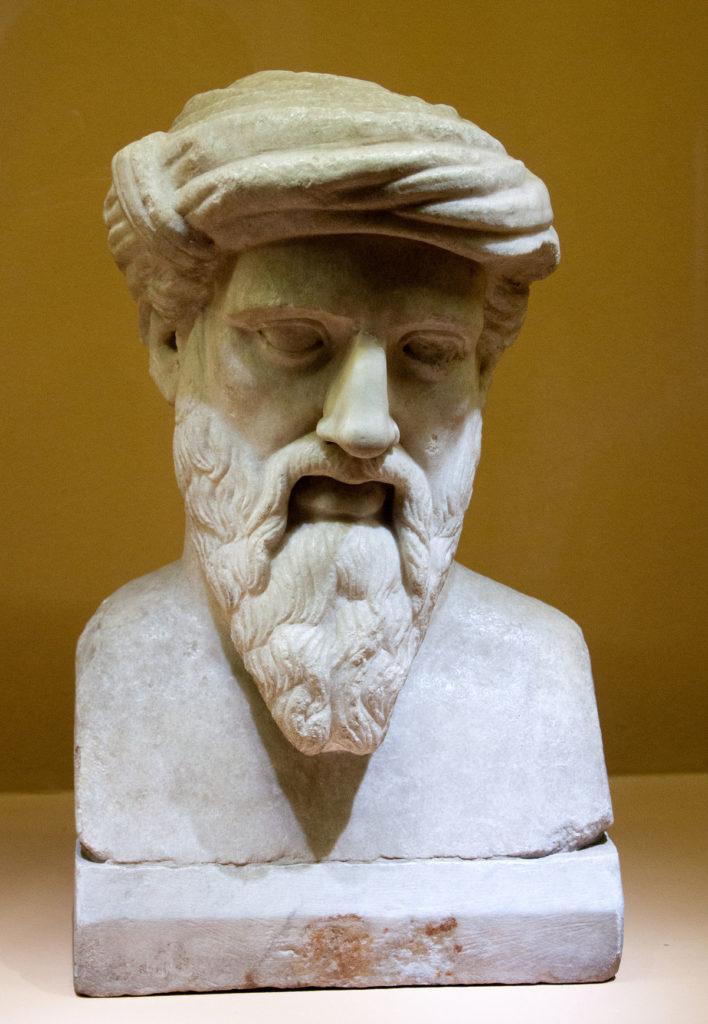
Pythagoras is one of the more recognizable philosophers of ancient Greece. He’s known as the father of mathematics, with his most notable work being the Pythagorean Theorem. He was born on the island of Samos and belonged to a group of new-wave pre-Socratic philosophers.
His main objective was to use mathematics to offer a harmonious and rational way of explaining the universe. He believed that the universe was governed by math and considered it necessary for understanding cosmology.
Pythagoras developed many theories that we still use today. He discovered the relationship between numbers, proportions, ratios, sound, harmonics, and more. He also made valuable contributions to geometry, which would go on to influence architecture.
Scholars also note Pythagoras’ role in shaping how philosophers formed theories. He perfected deductive reasoning, shaping how scholars work even today.
Pythagoras influenced many philosophers moving forward. He was great friends with Plato, even appearing in “The Republic.” Eventually, Pythagoras started his own academy in Italy. However, some viewed it as more of a cult due to the strict rules about diet and behavior. Pythagoras was a rational and intelligent man. But, he believed in a spiritual connection between numbers and the divine. He thought that they could provide divine insight and philosophical revelations.
Socrates (469 BC – 399 BC)
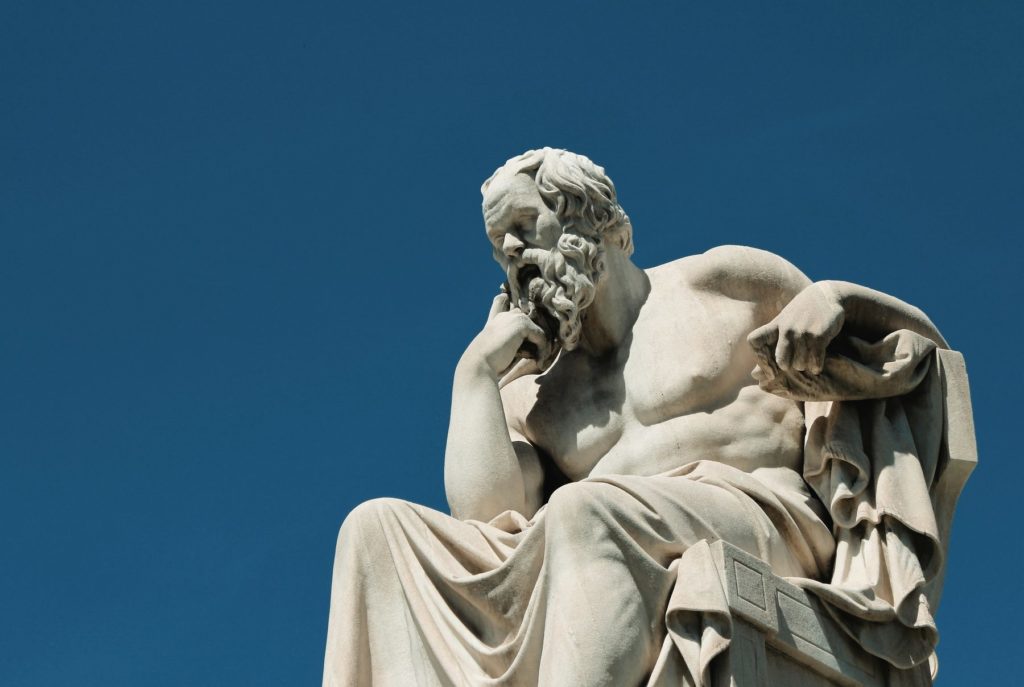
Socrates is, arguably, one of the most famous Greek philosophers to ever live. He was an Athenian thinker who believed that knowledge was the ultimate good. He pursued it at all costs, founding some of the most important principles of Western philosophy. He’s considered the first moral philosopher. He presented quandaries that continue to confound thinkers the world over.
Socrates is most known for developing the Socratic method, which we still use to this day. This method involves asking questions and opening a dialogue to expose truths, flaws, and contradictions. It’s used in everything from science to law, helping people find the truth and scrutinize ideas as much as possible.
This philosopher taught many future thinkers. Some of his most famous pupils were Plato and Xenophon. Socrates would become a central part of Plato’s dialogues, serving as a nexus for the Socratic method. None of Socrates’ works survived, but his legacy remains thanks to accounts from other writers after his death.
Socrates’ methods were not viewed favorably. He was accused of corrupting Athenian youth. He was tried and ultimately accepted the guilt. Instead of falling to ignorance and allowing himself to become executed, Socrates took his own life. He swallowed hemlock poison to take his own life.
Plato (427 BC – 347 BC)

A student of the great Socrates, Plato furthered the torch of philosophy, becoming a founding figure of Western thought. Like his teacher before him, Plato continues to be a major influence in the world of academia. He authored books like “The Republic” and “Symposium,” which survived to teach scholars for centuries.
Plato was born to Athenian aristocrats in a time of great upheaval. While he initially had political aspirations, witnessing mass destruction changed his goals. He viewed political regimes without philosophy as corrupt. So, he chose to focus his attention on human nature and reasoning.
The foundation of Plato’s philosophical ideas were dialects, ethics, and physics. He manages to combine the approaches of metaphysics and theology with the ethical theology developed by Socrates. The philosopher also delved into epistemology. He developed theories about the transcendental “World of Ideas.”
One of Plato’s most famous concepts was that of the “perfect form.” He believed that humans had intrinsic knowledge of the perfect forms that shape every object on Earth. However, our fallible human senses prevent us from seeing the truth. He illustrates this idea with the “Allegory of the Cave.”
Plato founded his own school of thought, which was called Platonism. His school of Athens taught many notable philosophers. Some include recognizable names like Aristotle, Xenocrates, Heraclides Ponticus, and more.
Protagoras (490 BC – 420 BC)
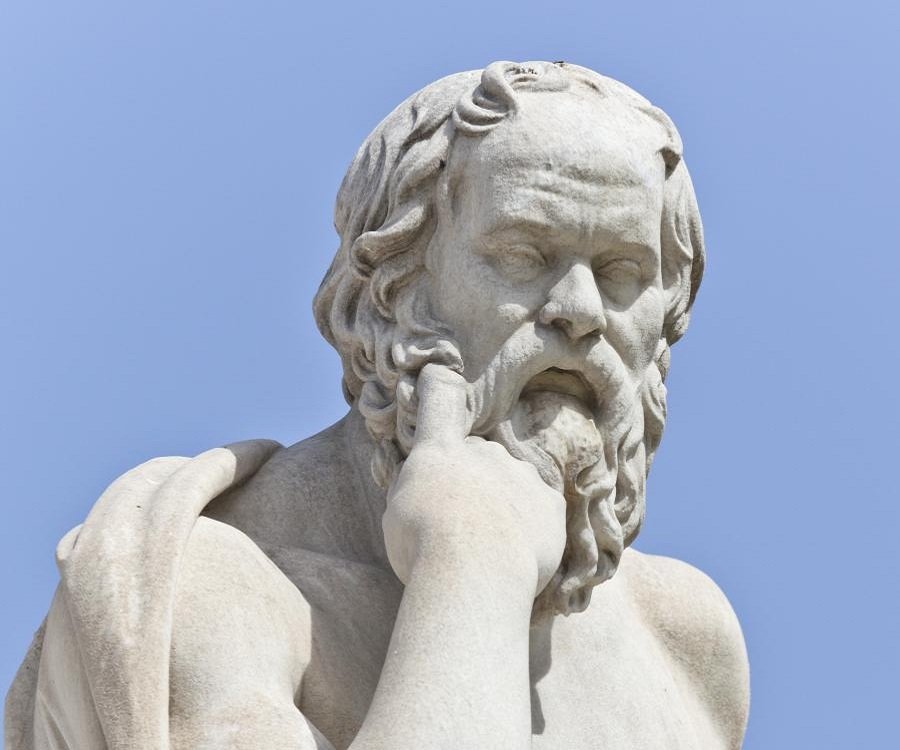
Protagoras was both a philosopher and a rhetorical theorist. Born in Thrace, Protagoras reportedly started life as a porter. But upon using his natural skills to make his job more proficient, he caught the attention of Democritus, who took him under his wing. Protagoras eventually became a legal counselor, serving throughout the Golden Age of Athens. He acted as an advisor to Pericles, developed political philosophy, and more.
Plato described Protagoras as one of the sophists. He’s credited for founding the school of sophistic movement.
Protagoras earned his fair share of controversy due to his philosophical ideas. He was one of the first to speak of individual relativity, which ultimately led to the creation of relativism. The philosopher believed that the character of a person determined its worth. This theory was controversial at the time because it introduced the idea of subjectivity into the concept of belief.
He coined the phrase, “Man is the measure of all things,” to illustrate this idea. According to writings by Plato, that meant that absolute truth was impossible. Everything is relative based on your individual thought processes. Protagoras used this theory most to show the dichotomies that exist when discussing concepts of good and evil. What’s evil or good to one person might be the opposite to another.
Aristotle (384 BC–322 BC)
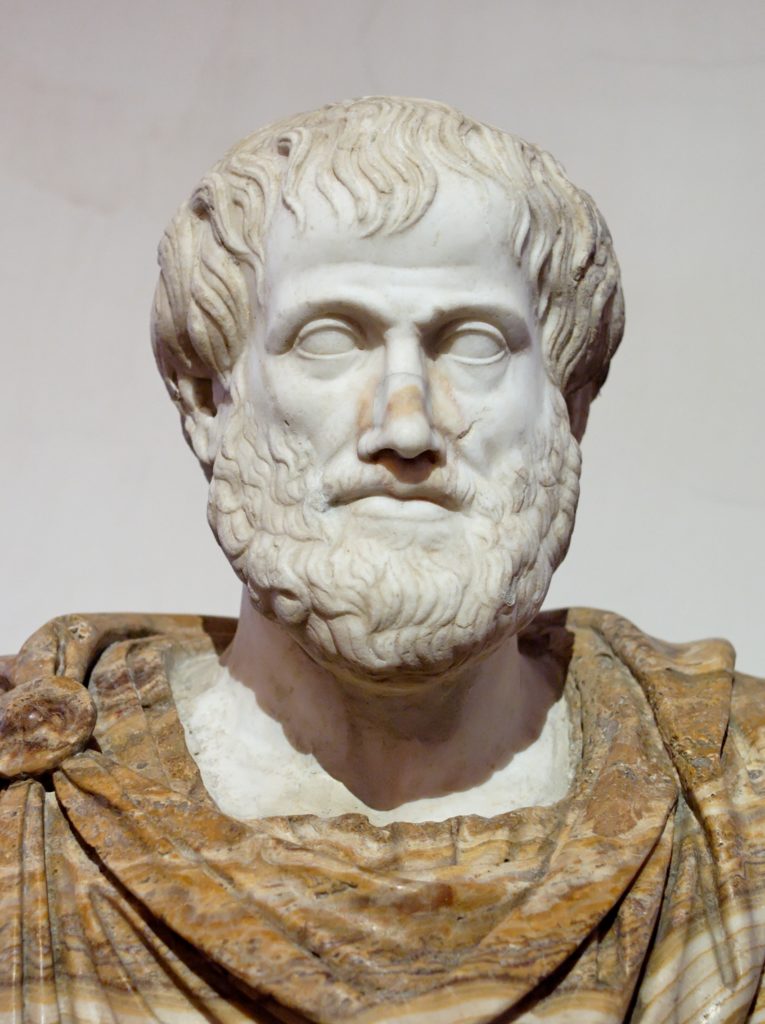
Aristotle was a student of Plato at the Academy. He’s one of Plato’s most prolific students. He furthered his mentor’s journey to understand how humans attain knowledge. However, Aristotle and Plato did not always see eye to eye on theories. Aristotle rejected Plato’s ideas of Forms. He believed that humans learned facts through the experience they gained throughout their lives.
Aristotle eventually left Plato to form his own school, the Lyceum. There, the philosopher would go on to teach notable students like Alexander the Great, Aristoxenus, and Theophrastus. Interestingly enough, Aristotle was one of the first Greek philosophers to have his theories translated to Arabic. For this reason, his teachings spread far.
Throughout his life, Aristotle developed many philosophical ideas. His writings involved many subjects, with musings covering everything from government to biology. His interests involved human knowledge, observation, and how we learn.
He developed a type of logic called “syllogism.” The technique involves analyzing two or more concepts to come up with a conclusion. Aristotle used syllogism to study a wide range of topics. The philosopher was also one of the first to break up the overly-generalized nature of human knowledge. He created the classification system of subjects we use today. In doing so, he separating knowledge into core topics like mathematics, physics, biology, etc.
Thales of Miletus (620 BC–546 BC)
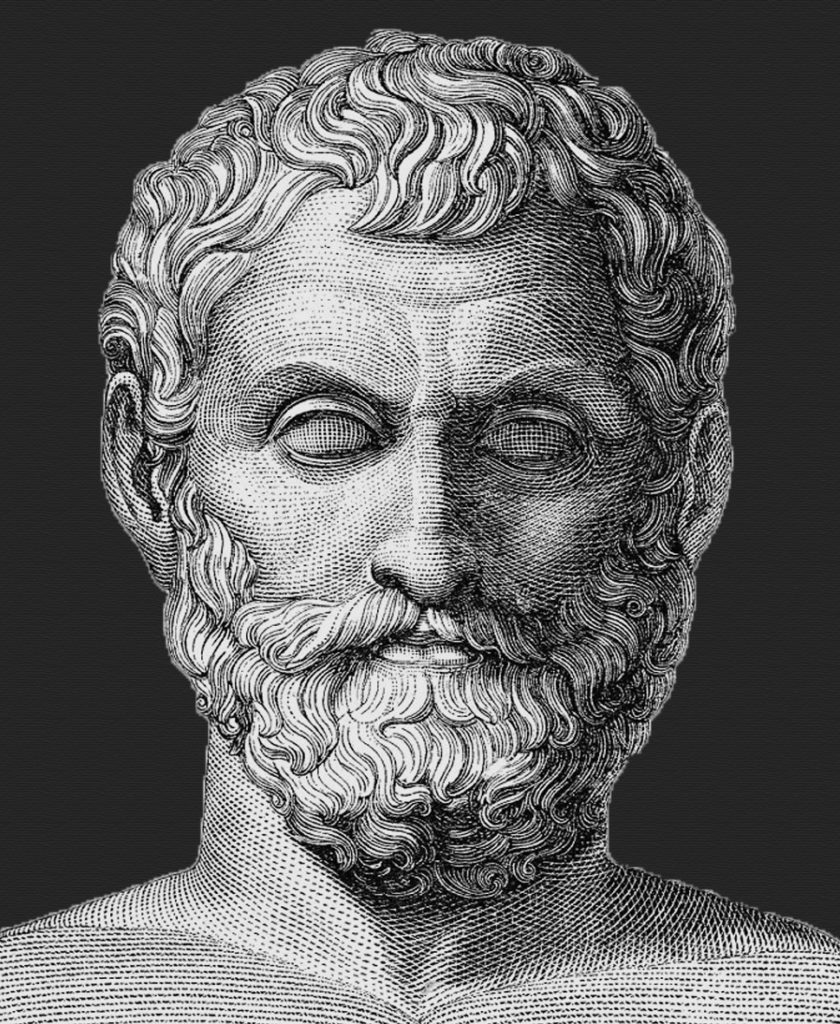
Thales of Miletus is regarded as the first great Greek philosopher for many scholars. He started the act of scientific philosophy. Not only that, but he is credited with single-handedly starting the Greek tradition of philosophy.
Thales was born in Miletus, a city in Asia Minor. Most of the information we have about Thales comes from Aristotle. Aristotle credits Thales with being the first to investigate natural science, the origin of matter, and other basic principles of life. He’s developed the school of naturism and was considered a Monist, as he believed a single element was the primary component of the universe.
While that theory sounds incorrect by today’s standards, there was merit to his thinking. The philosopher looked beyond mythology and divine sources. He observed material he believed could fit the criteria. He concluded that water was the origin of life.
Thales of Miletus was one of the Seven Sages of Greece and was widely respected for his work. Many consider him the “Father of Science.” Not only did he develop principles we still use today, but he went on to teach the greats! Thales of Miletus found the Milesian School, educating students like Pythagoras.
Link/cite this page
If you use any of the content on this page in your own work, please use the code below to cite this page as the source of the content.
Link will appear as The Greatest Ancient Greek Philosophers: https://greekgodsandgoddesses.net - Greek Gods & Goddesses, December 30, 2021